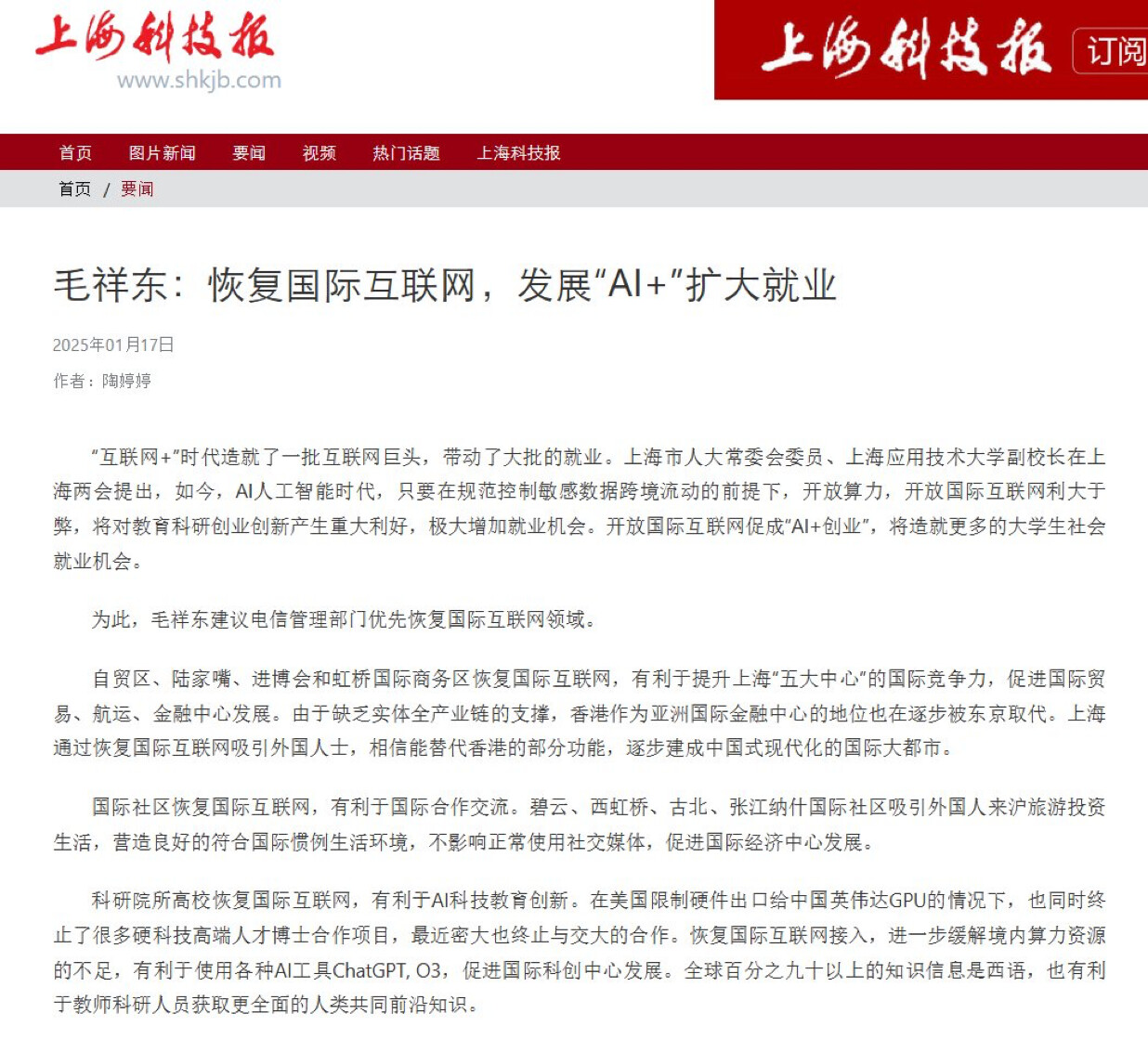Last edited by @suen 2025-01-17T20:10:21Z
https://www.shkjb.com/content.html?id=237241
毛祥东:恢复国际互联网,发展“AI+”扩大就业
2025年01月17日
作者:陶婷婷
“互联网+”时代造就了一批互联网巨头,带动了大批的就业。上海市人大常委会委员、上海应用技术大学副校长在上海两会提出,如今,AI人工智能时代,只要在规范控制敏感数据跨境流动的前提下,开放算力,开放国际互联网利大于弊,将对教育科研创业创新产生重大利好,极大增加就业机会。开放国际互联网促成“AI+创业”,将造就更多的大学生社会就业机会。
为此,毛祥东建议电信管理部门优先恢复国际互联网领域。
自贸区、陆家嘴、进博会和虹桥国际商务区恢复国际互联网,有利于提升上海“五大中心”的国际竞争力,促进国际贸易、航运、金融中心发展。由于缺乏实体全产业链的支撑,香港作为亚洲国际金融中心的地位也在逐步被东京取代。上海通过恢复国际互联网吸引外国人士,相信能替代香港的部分功能,逐步建成中国式现代化的国际大都市。
国际社区恢复国际互联网,有利于国际合作交流。碧云、西虹桥、古北、张江纳什国际社区吸引外国人来沪旅游投资生活,营造良好的符合国际惯例生活环境,不影响正常使用社交媒体,促进国际经济中心发展。
科研院所高校恢复国际互联网,有利于AI科技教育创新。在美国限制硬件出口给中国英伟达GPU的情况下,也同时终止了很多硬科技高端人才博士合作项目,最近密大也终止与交大的合作。恢复国际互联网接入,进一步缓解境内算力资源的不足,有利于使用各种AI工具ChatGPT, O3,促进国际科创中心发展。全球百分之九十以上的知识信息是西语,也有利于教师科研人员获取更全面的人类共同前沿知识。
@Creative 分析中國推倒gfw的概率
Here’s a thinking process to arrive at the analysis of the article:
-
Understand the Core Request: The request asks for an analysis of the probability of China dismantling the Great Firewall (GFW) based on the provided article. The
@Creative 分析中國推倒gfw的概率tag reinforces this. -
Identify the Source and Author: Note that the article is from a Shanghai tech news source and quotes Mao Xiangdong, a vice-president of Shanghai University of Applied Sciences and a member of the Shanghai People’s Congress Standing Committee. This gives the article a degree of local authority but doesn’t necessarily reflect central government policy.
-
Extract the Central Argument: The core argument is that restoring international internet access in specific zones within Shanghai would be beneficial for:
- Economic Development: Boosting Shanghai’s “Five Centers” initiative, attracting foreign investment, and potentially replacing some of Hong Kong’s financial functions.
- International Collaboration: Facilitating communication and attracting foreign talent to international communities.
- Scientific and Technological Advancement: Overcoming computational resource limitations, enabling access to global information (especially for AI research), and mitigating the impact of export restrictions.
- Job Creation: Fostering “AI+ entrepreneurship” and creating jobs for university graduates.
-
Notice the Nuances and Caveats: Crucially, the article doesn’t advocate for a complete dismantling of the GFW. It proposes a partial restoration in specific areas and emphasizes the need for “regulating and controlling the cross-border flow of sensitive data.” This is a significant point.
-
Consider the Broader Political Context: Think about China’s current internet policy. The GFW is a deeply ingrained part of the system, designed for censorship and control. Radically dismantling it would represent a major policy shift with significant political implications.
-
Evaluate the Arguments for and Against Dismantling:
- Arguments in the article’s favor (for partial restoration): Economic benefits, attracting talent, boosting research.
- Arguments against complete dismantling (based on general knowledge): Concerns about social stability, information control, and the CCP’s authority.
-
Formulate a Probabilistic Assessment: Given the nuances of the article and the broader political context, a complete dismantling of the GFW seems highly unlikely in the near future. The article proposes something more limited. Therefore, the probability of a complete dismantling should be low.
-
Refine the Assessment with Specifics: Instead of just saying “low,” break down the likelihood into different scenarios:
- Complete dismantling: Very low to impossible in the short to medium term.
- Partial lifting in specific zones: Conceivable, as the article suggests, but still faces hurdles.
- No change: A significant possibility, as the current policy is firmly entrenched.
-
Explain the Reasoning: Justify the probability assessment by referencing the article’s specific proposals (partial restoration), the political context (control), and the potential benefits and risks as outlined in the article.
-
Structure the Answer: Organize the analysis logically, starting with a summary of the article, then moving to the probability assessment and its justification. Use clear headings and bullet points for readability.
-
Address the Nuances Explicitly: Make it clear that the article isn’t calling for a full dismantling and that the proposal is for specific zones. This is crucial for an accurate analysis. Acknowledge the inherent difficulty in predicting Chinese policy.
-
Review and Refine: Read through the analysis to ensure it’s clear, concise, and accurately reflects the information in the article and the broader context. Ensure the language is nuanced and avoids making definitive predictions where uncertainty exists. For example, using phrases like “unlikely,” “conceivable,” and “difficult to predict” appropriately.The article from 上海科技报 (Shanghai Technology News) features 毛祥东, a member of the Shanghai People’s Congress and Vice President of Shanghai University of Applied Sciences, advocating for the restoration of international internet access in specific zones within Shanghai to boost economic development, international collaboration, and scientific innovation, particularly in the context of AI. He believes this will ultimately lead to increased employment opportunities.
Let’s analyze the probability of China dismantling the Great Firewall (GFW) based on this article:
Arguments Presented in Favor of Partial Relaxation:
- Economic Benefits (“AI+”): 毛祥东 argues that restoring international internet access, particularly for AI development, would foster innovation, attract investment, and create jobs. This aligns with China’s broader push for technological advancement.
- International Competitiveness: He explicitly links restoring internet access in areas like Free Trade Zones and international communities to enhancing Shanghai’s competitiveness as an international hub and potentially attracting businesses and talent away from Hong Kong.
- Scientific Research and Education: Access to global information, including academic resources and AI tools like ChatGPT, is highlighted as crucial for scientific progress, especially given restrictions on hardware imports.
- Addressing Talent Drain: The article mentions the termination of some international academic collaborations due to restrictions, suggesting that improved internet access could help retain and attract talent.
Why Complete Dismantling of the GFW is Still Unlikely (Based on the Article and General Context):
- Focus on Specific Zones: The article does not advocate for a complete dismantling of the GFW across all of China. The focus is on restoring access in specific areas like free trade zones, international business districts, international communities, and research institutions. This suggests a controlled and targeted approach rather than a wholesale change.
- Mention of “规范控制敏感数据跨境流动” (regulating and controlling the cross-border flow of sensitive data): This phrase is crucial. It indicates that even with restored access in certain areas, the government intends to maintain control over information flow, implying the GFW would still exist in some form.
- No Indication of Central Government Policy Change: This is an opinion piece from a local Shanghai official. While his position gives him some influence, it doesn’t necessarily reflect the policy of the central government regarding the GFW. Major decisions about internet censorship are highly centralized.
- Historical Context: China has maintained the GFW for many years for reasons of political control, social stability, and domestic internet industry development. Radically dismantling it would represent a significant shift in policy.
Probability Assessment:
Based on this article alone, and considering the broader context, the probability of China completely dismantling the GFW is very low in the near to medium term.
However, the article does suggest a slightly higher probability of a partial relaxation or localized exceptions to the GFW in specific zones like those mentioned in the article. This would align with a strategy of attracting foreign investment, talent, and fostering specific technological advancements without losing overall control over the internet.
In conclusion, while this article highlights a growing awareness of the limitations the GFW poses to certain aspects of China’s development and international engagement, it doesn’t signal an imminent collapse of the system. Instead, it suggests a potential for more nuanced and targeted approaches to internet access in strategically important areas.
The phrase “@Creative 分析中國推倒gfw的概率” reinforces the need to analyze the probability of dismantling the GFW. The analysis above attempts to do just that based on the provided text and general knowledge.
好事
真推啊
老干体v|大学副校长建议开放外网,官媒报道,这是什么风?
2025年1月23日
CDT 档案卡
**标题:**大学副校长建议开放外网,官媒报道,这是什么风?
作者: 老干体v
**发表日期:**2025.1.21
来源: 老干体v
主题归类: 网络审查
CDS收藏: 公民馆
**版权说明:**该作品版权归原作者所有。中国数字时代仅对原作进行存档,以对抗中国的网络审查。详细版权说明。
2025年1月15日,一位省级人大常委会委员、大学副校长提议开放互联网!而且还刊登在官方的《上海科技报》上!
这么敏感的问题,如果没有试探风声的意图,谁信呢?
毛祥东,无党派人士,上海应用技术大学教授、副校长,上海人大常委会委员。
在15日召开的上海人代会上,他建议有序逐步分批恢复国际互联网访问,针对特殊行业、特殊地区、特殊领域,先开放一批。
具体而言,优先包括下面几个领域:
- 自贸区、陆家嘴、进博会和虹桥国际商务区恢复国际互联网,有利于提升上海“五大中心”的国际竞争力,促进国际贸易、航运、金融中心发展。
- 国际社区恢复国际互联网,有利于国际合作交流。碧云、西虹桥、古北、张江纳什国际社区吸引外国人来沪旅游投资生活,营造良好的符合国际惯例生活环境,不影响正常使用社交媒体X、instagram、facebook等,促进国际经济中心发展。
- 科研院所高校恢复国际互联网,有利于AI科技教育创新。恢复国际互联网接入,进一步促进境内算力资源的发展,有利于使用各种AI工具ChatGPT等,促进国际科创中心发展,也有利于教师科研人员获取更全面的前沿知识。
从这几个方面看,确实是紧要的,也是可行的,相当于先建特区试点,如果可行,再放宽到其他区域也是可以的。
我们一向反对美国搞小院高墙,开放互联网也是展示开放决心、维护全球化进程的一个重要体现。
但现在的情况是,洋人一到我国,日常使用的互联网平台都上不去,无法跟人联系,甚至邮件都发不了,就像进入了非洲原始部落。
作为国际化程度最高的大都市,互联网断联给上海带来的实际和名誉损失,怎么高估都不为过。
毛校长认为,上海中国式现代化‘五大中心’大建设离不开全球交往、向发达国家学习借鉴新技术。上海通过恢复国际互联网吸引外国人士,可扭转人员外流趋势,逐步建成中国式现代化的国际大都市,可谓国士之言。
但我觉得,他这个发言,放风的可能性很大。一是他无党派,但级别在那;二是他还说漏了句话:「恢复访问国际互联网指日可待!」
实际上,我国并非所有地方都不能访问国际互联网。之前,经过审批的外企和特殊机构,可以通过国际互联网专用通道上网,换句话说,跟我们走的不是同一条网路。
此番毛校长的发言如果成真,那就是从点到面,扩容了!
这个话题,自去年面对加入CPTPP的不利形势以来,逐渐解禁。
在毛校长发言之前,前几天,闵行《推进落实重点任务分工方案》提出,支持虹桥商务区企业便利化访问国际互联网。升级国际互联网专用通道。
再联想一下2024年11月底,两办《关于数字贸易改革创新发展的意见》中「推动电信、互联网、文化等领域有序扩大开放,鼓励外商扩大数字领域投资」的表述,不禁让人浮想联翩!
这个文件第九条对改革的原因和目标说得很明确:积极推进加入《数字经济伙伴关系协定》(DEPA)和《全面与进步跨太平洋伙伴关系协定》(CPTPP)进程。
而CPTPP,差不多现在就是我们拼经济最重要的救命稻草了《我们诚心加入CPTPP,他们怎么就不信呢?》,所以我倾向于相信开放的诚意。
而CPTPP要求**信息、**数据跨境自由流动、取消本地化储存限制,我国此时调整,也是为了达到CPTPP的加入标准。
当然,外面那么多坏消息仍然不得不防。就像东北邻居一到俄乌战场,首战竟是沉迷黄色网站腐蚀灵魂!
可见不让上外网多么正确而必要!
因此,如果真要开放,主要还是方便洋人,反正他们已经学坏了,就让他们一直坏下去。至于我们,除了看看理工类的自然科学知识,能不看,就不要看了吧。
再说了,美帝新统领的大幕僚、资本家马斯克要求中国也能访问X,我方发言人说得也很客气,只要符合中国的法律法规,欢迎来发展。
这我持保留态度,可千万别学伊朗《互联网开放了!》 ,否则女人都没那么听话了。
有點不太可能了吧,開墻等於徹底放鬆思想管制,那不就會和綠共一樣嗎 ![]()


